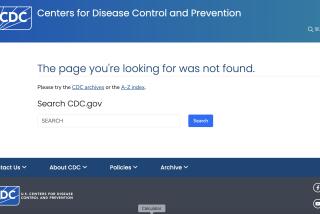Plan to Ease Curbs on AIDS-Infected Doctors Is Scrapped : Health: Federal officials say the proposals were withdrawn over legal questions. Critics charge that the action was politically motivated.
- Share via
WASHINGTON — Federal health officials have quietly dropped plans to ease proposed restrictions on AIDS-infected physicians, dentists and others who perform invasive surgery, according to knowledgeable sources.
Their decision means that states could prohibit AIDS-infected physicians from performing certain surgical procedures. Also, in situations where doctors are allowed to continue to practice, they could be required to tell their patients they are infected.
Officials at the Department of Health and Human Services said the less restrictive proposals were withdrawn after legal questions were raised within the department over whether the newest recommendations violated the will of Congress.
But proponents of the less restrictive guidelines charged that the action was politically motivated and that department officials “were hiding political interference behind legal excuses.”
Both sets of guidelines urge surgeons, dentists and others who perform invasive procedures to voluntarily undergo testing for the human immunodeficiency virus, which causes AIDS, and to seek advice before local review panels about whether to continue practicing.
The newest proposals had dropped two controversial provisions: that physicians inform their patients they are infected, and that health officials draw up a list of procedures believed to offer the greatest risk of transmission.
Health officials, in fact, had abandoned the latter idea some months ago, concluding that such a list was impossible to compile because the overall risk of transmission has proved to be remote.
Usually, health policy guidelines issued by the federal government are voluntary, and states typically use them as a road map to develop their own public health rules.
But the issue of HIV transmission between infected doctor and patient has been an unusually emotional one, prompting Congress to become involved.
The issue has stirred an intense national debate in the nearly two years since it was revealed that Dr. David Acer, a Florida dentist with AIDS, had apparently infected five of his patients.
One of those was Kimberly Bergalis, a young woman who became the symbol of the AIDS “innocent victim.” Until her death from AIDS in December, she crusaded for mandatory testing of health professionals and severe professional restrictions against those who were infected.
Her cause was embraced by many conservative lawmakers, including Rep. William E. Dannemeyer (R-Fullerton) and Sen. Jesse Helms (R-N.C.).
Congress passed legislation in October, 1991--shortly after the federal Centers for Disease Control released its first set of proposals--that required states to adopt these or similar guidelines by next October or risk losing federal funding for public health programs.
CDC officials decided to rewrite the guidelines after studies of thousands of patients of HIV-infected physicians showed not a single instance of doctor-to-patient transmission. In fact, the Florida case is the only known doctor-to-patient transmission in 11 years of the epidemic.
Advocates of the revised guidelines said Congress passed the legislation aware that the policy could be altered and updated based on new research.
“The legislation was passed with the full knowledge that information was not static and the CDC might reassess its position,” said Jeff Levi, director of government affairs for the Washington-based AIDS Action Council.
Also, sources said high-ranking department officials were concerned about political fallout from the new and less restrictive guidelines. They “just don’t want to deal with this issue before the election,” one source said.
Assistant Secretary for Health Dr. James O. Mason, however, insisted that the decision was not political.
“The decision was a legal and statutory one,” he said. “The legal people felt that any changes in the guidelines had to be examined within the context of the law passed by Congress, and that you couldn’t switch the guidelines without going back to (Capitol) Hill.”
Federal health officials, who are upset by the latest development, said privately that they believe the existing guidelines are subject to flexible interpretation.
As a result, they said they intend to advise states in the coming months to “interpret them in a way that will be closer to the revised recommendations.” They hoped that approach would avoid provoking a dispute within the department, or with Congress, sources said.
“That’s the way we’re trying to get around the problem,” one source said. “It’s just not going to be easy to change these guidelines without a lot of screaming and shouting because the nation is so polarized on this issue.”
But Dr. Neil Schram, head of the AIDS task force for the American Physicians for Human Rights, a lesbian and gay physicians’ organization, predicted that the current situation would cause havoc among the states.
“It’s going to create absolute chaos,” he said. “The battle CDC fought for two years to come up with the correct science will now be brought into every one of the 50 states.”
More to Read
Sign up for Essential California
The most important California stories and recommendations in your inbox every morning.
You may occasionally receive promotional content from the Los Angeles Times.









